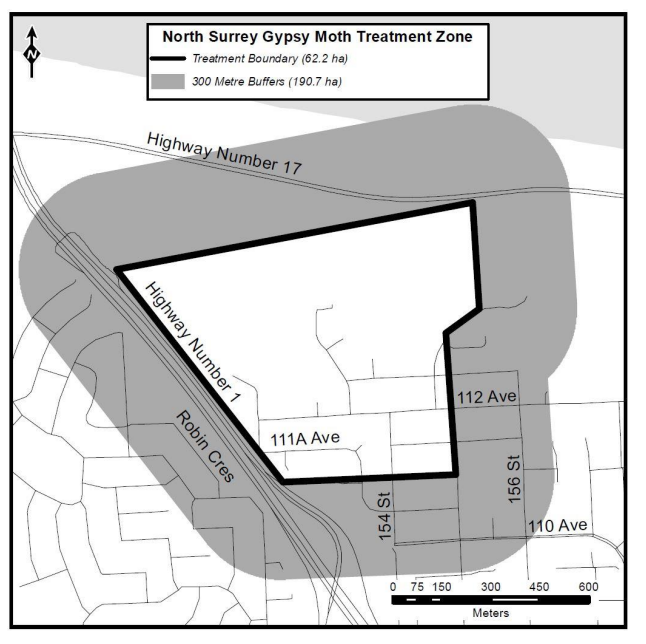The first aerial-spraying of the year to remove invasive gypsy moths begins Wednesday in the Fraser Heights area of Surrey.

The European Gypsy moth was introduced from Europe to the northeastern parts of the U.S. around the 1860’s. A North American breed of this moth was first seen in B.C. in 1978.
“Because they have no natural predators the gypsy moth, you know, has the potential to establish quite rapidly and expand its range,” said provincial forest entomologist Babita Bains.
Low-flying planes will be distributing the spray daily between 5:20 a.m. and 7:30 a.m. close to Highway 1 near the Port Mann Bridge, according to the Ministry of Forests Lands and Natural Resource Operations.
Residents in North Surrey are likely to hear planes hovering as they cover the 62 hectares of the residential and municipal park area, it added.
This isn’t the only neighbourhood affected by invasive gypsy moths, but officials say it’s proven to be more stubborn and wasn’t responding to previous treatments such as ground spraying and traps.

Bains said this is the province’s third attempt to eradicate the species and she hopes that it will be effective.

Get daily National news
“We determine if a population is becoming established, at that point we will either implement mass trapping or aerial or ground spray program,” said Bains.
The spray contains Foray 48B, which consists of an ingredient called bacillus thuingiensis var kurstaki or Btk.
Btk is a bacterium that is naturally found in urban, forest and agricultural soils throughout the province. This ingredient has been approved and used to control gypsy moth larvae in Canada, since 1961.
WATCH (Aired 2015) Rallies against moth spraying held in Surrey
“It will settle on the leaves of various trees and shrubs within the spray area and from there the caterpillars will consume that material and ingest the material and the Btk will activate within the gut of the caterpillar,” explained Bains.
Foray 48B and other Btk formulations received certification in April 2018 by the Organic Material Review Institute of Canada. It’s believed not to be harmful towards people or animals.
The GPS-controlled treatment is supposed to spray Btk when it is directly over the treatment area. The ministry is aiming to finish the aerial-spraying by mid-June, if there are no delays because of poor weather or windy conditions.
Any residents wanting to avoid contact with the spray will have to remain indoors with their windows and doors closed during the treatment, and for at least 30 minutes after.
The provincial government warns any frightened animals or livestock should be moved inside, and that items outside should be covered or moved indoors.
A 24-hour bulletin will be issued before each treatment, residents can call 1-866-917-5999 for more information.







Comments
Want to discuss? Please read our Commenting Policy first.